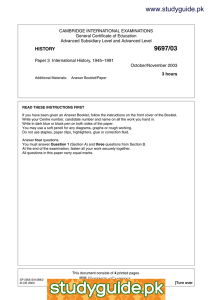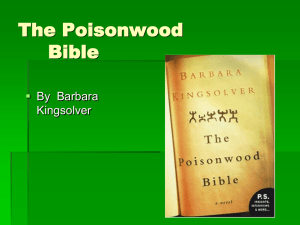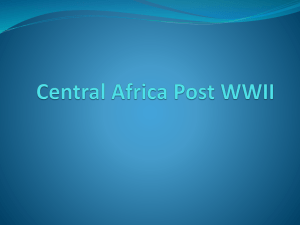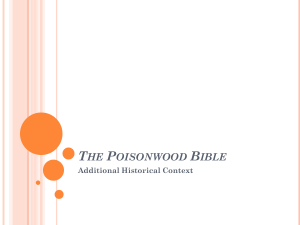CAMBRIDGE INTERNATIONAL EXAMINATIONS General Certificate of Education www.XtremePapers.com
advertisement
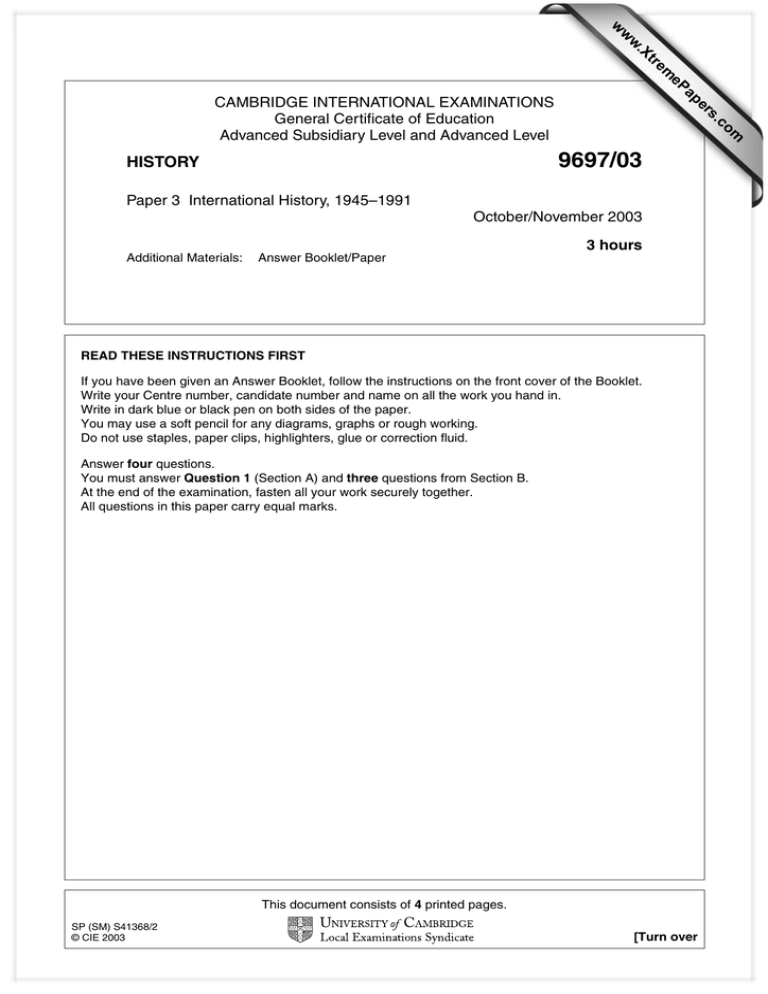
w w ap eP m e tr .X w om .c s er CAMBRIDGE INTERNATIONAL EXAMINATIONS General Certificate of Education Advanced Subsidiary Level and Advanced Level 9697/03 HISTORY Paper 3 International History, 1945–1991 October/November 2003 3 hours Additional Materials: Answer Booklet/Paper READ THESE INSTRUCTIONS FIRST If you have been given an Answer Booklet, follow the instructions on the front cover of the Booklet. Write your Centre number, candidate number and name on all the work you hand in. Write in dark blue or black pen on both sides of the paper. You may use a soft pencil for any diagrams, graphs or rough working. Do not use staples, paper clips, highlighters, glue or correction fluid. Answer four questions. You must answer Question 1 (Section A) and three questions from Section B. At the end of the examination, fasten all your work securely together. All questions in this paper carry equal marks. This document consists of 4 printed pages. SP (SM) S41368/2 © CIE 2003 [Turn over 2 Section A You must answer Question 1. THE UNITED NATIONS AND THE CONGO CRISIS, 1960 –1 1 Read the sources and then answer the question. Source A In high quarters here it is the clear-cut conclusion that if Lumumba continues to hold high office, the inevitable result will be at best chaos and at worst pave the way to a Communist takeover of the Congo, with disastrous consequences for the UN and the free world generally. Consequently we conclude that his removal must be an urgent and prime objective and that under existing conditions this should be a high priority of our covert actions. Allan Dulles, Head of the CIA, to the chief CIA agent in the Congo, 26 August 1960. Source B I am seriously concerned at what appears to be the threat of unilateral action in the Congo. I find it difficult to believe that any government is really planning to take so dangerous and irresponsible a step. Nevertheless I feel it important that there should be no misunderstanding of the United States’ position in such an eventuality. The United States has supported and will continue to support the United Nations’ presence in the Congo. Only by the presence of the United Nations in the Congo can peace be kept in Africa. I would conceive it to be the duty of the United States to defend the Charter of the United Nations by opposing any attempt by any government to intervene unilaterally in the Congo. President Kennedy at a news conference, 15 February 1961. Source C It was in the climate following news of the death of Lumumba in February 1961 that the United States was able to agree with the Afro-Asian countries on a policy for the UN which went far beyond anything previously agreed. In this climate neither the Soviet Union – despite its radical hostility to Hammarskjold and the UN Congo operation – nor Britain and France felt able to veto measures agreed by the United States and the Afro-Asian countries. In these circumstances the fateful Security Council resolution of 21 February 1961 came into being. Soviet propaganda asserted that Hammarskjold would never carry out the resolution. Hammarskjold and his collaborators were determined that it must be carried out. And Hammarskjold could rely on a degree of backing from the new American administration which he had not received from the old. The Democratic administration has in fact steadily supported the UN effort in the Congo, the United States under that administration has been the only major power to give such support. Conor Cruise O’Brien, Irish politician, special UN representative in Katanga, the Congo, 1961–3, writing in his book ‘To Katanga and Back’, 1962. 9697/03/O/N/03 3 Source D In July 1960 both the United States and the Soviet Union were keenly interested in the future of the Congo, which was the richest former colony in natural resources in Africa. The size and activity of the Soviet embassy in the Congo particularly alarmed Washington. Lumumba’s visit to Washington in July 1960 went badly and a month later his rejection of the UN and appeal to the Soviet Union for help confirmed the Eisenhower administration’s worst fears. The consequent authorisation by the Eisenhower administration of the CIA to assassinate Lumumba, an elected prime minister, was an outrageous decision, fortunately frustrated by the UN troops protecting Lumumba’s residence and by a lack of enthusiasm among CIA field officers for using poisoned toothbrushes and other equally weird devices. Washington strongly criticised the UN mission in the Congo for protecting Lumumba. The obsession of the USA with the Cold War, not neo-colonialism, accounted for the extraordinary nature of United States Congo policy. Brian Urquhart, British civil servant, UN representative in the Congo, 1961–2,writing in an American journal, 2001. Source E After a difficult debate at the end of which the Soviet Union vetoed some of the wording in a draft resolution, the Security Council adopted a detailed resolution (France and the Soviet Union abstaining). It urged the UN to take all appropriate measures to prevent civil war in the Congo, including the use of force if necessary. This resolution had no parallel in UN history. The Council had authorised a ‘non-threatening’ peacekeeping force to adopt an enforcement role without first determining that a threat to international peace existed. It also left the command and control of such an operation in the hands of the Secretary-General, a procedure deeply disliked by those who interpreted the Charter narrowly, such as the Soviet Union. But this was the best the Council could do. The Soviet Union had broken off relations with Hammarskjold but was not ready for an all-out confrontation, either with the United States or with their new Afro-Asian friends who supported the Secretariat operation. A British diplomat’s account, published in 1995, of the debate in the UN following Lumumba’s murder in January 1961. Now answer the following question. How far do Sources A–E support the view that ‘the efforts of the United Nations in 1960–1 to resolve the crisis in the Congo were undermined more by the USSR than by the USA’? 9697/03/O/N/03 [Turn over 4 Section B You must answer three questions from this section. You must not answer both Question 3 and Question 4. 2 ‘The Marshall Plan caused the division of Europe and thus the Cold War.’ Discuss this assertion. 3 ‘The Cold War became truly global only after 1962.’ How far does your study of the Cold War in the period 1950–80 support this view? OR 4 How seriously did the Sino-Soviet conflict weaken the Communist bloc? 5 Explain the effects of the collapse of the USSR in the period 1985–1991 upon the foreign policy of the USA. 6 Analyse the impact of the nuclear arms race on the Cold War during the period 1950–1980. 7 Why did the international economy experience serious problems in the 1970s and early 1980s? 8 How far do you agree that the provision of economic aid to developing countries did more harm than good? 9697/03/O/N/03
